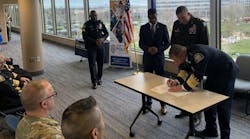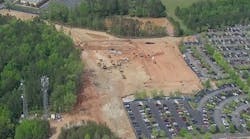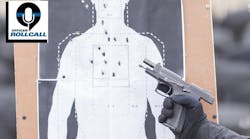When two South Jersey men rescued a 9-year-old boy from a burning car last week, many who read the story wondered if they would be able to do the same.
What makes some people run toward a burning car while others stand frozen?
It's part nature and part nurture, according to experts. Those who dash into a burning building to save others may be genetically predisposed to that reaction, and their life experiences might make them more likely to make that choice at a critical moment.
"It's not like 'heroes' are superhuman," said Daniel Hart, a psychology professor at Rutgers University-Camden who studies moral development.
The two men who ran toward the burning car were, like many on that stretch of highway in Salem County at about 6 p.m., heading home from work.
The boy, Hakeem Crain of Lanham, Md., was in a Honda sedan with his mother and two men, headed south through Oldmans Township on July 11. The driver lost control, and the car crashed into the wooded median and struck a tree.
Almost as soon as people stopped to help, the car burst into flames.
Richard Vaughan, 43, of Lower Alloways Creek, pulled Hakeem from the backseat. Jon Parkinson, 40, of Pennsville, tried to choke the flames with a fire extinguisher he keeps in his truck.
They had time to save only the boy. Within seconds the car was engulfed. Both men said they hadn't stopped to think.
Parkinson is not an emergency medical technician, but he has taken safety training for his warehouse job.
Vaughan had worked as an EMT and volunteer firefighter, though not in recent years.
"I was scared when I was running up," he said. "You could already feel the heat, and you could smell the gasoline. I'd be crazy to say I wasn't scared running up to a car that was on fire."
But both men still helped, knowing that the car could explode. A woman also approached the car, but she couldn't pull the boy out and shouted for help.
Both men said that nearly a dozen others had stood nearby. Some were on their cellphones, likely calling 911. But others were seemingly frozen, they said.
Joseph V. Martin, a neuroscientist and head of the biology department at Rutgers-Camden, said people often freeze in a threatening situation when unsure what to do. People like Vaughan, who had previously responded in emergencies, might need less time to assess the situation and could possibly react more quickly.
"Having that prior knowledge would reduce the ambiguity about what to do, and reduce the fear," Martin said.
But not everyone who rushes to help has been trained for it. Parkinson, for example, has had limited training.
The instinct to help, even in the face of danger, could be a genetic predisposition, said Steven Berkowitz, director of the University of Pennsylvania's Center for Youth and Family Trauma Response and Recovery.
Adrenaline junkies tend to gravitate toward jobs in emergency response or in the military. Such people are more likely to run toward a burning building when everyone else is running from it, Berkowitz said.
"There are two primary responses: You fight or you flee," he said. "Those people who tend to rush in are the people who are going to fight... Those really are genetic differences in people."
But don't think that means there's a "hero gene," Berkowitz said.
"Experience affects how genes function," he said. "You can be trained and overcome your natural tendency to back off."
Hart said experience matters more. Most heroes who put themselves in danger are regular people, he said, citing a Canadian study of people like Parkinson and Vaughan.
"Given the right circumstances," he said, "people can discover a willingness in themselves to do the most remarkably positive things... just as certainly as one of the lessons of genocide and so on is that ordinary people, given the right circumstances, will do the most awful things to other people."
Timothy Seplaki, a paramedic from Bordentown, said some people got into the job for adrenaline, but that that wore off after the first couple of years. It's a desire to help people that drives most people to emergency-response work.
"I think that anybody who has a passion to do it can do it," he said.
Contact staff writer Joelle Farrell at 856-779-3237, [email protected], or @joellefarrell on Twitter.



